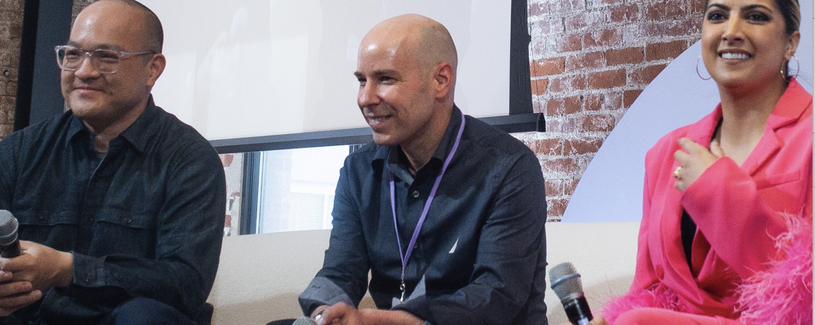The Future of Fashion: Printed Pants, Psychology, and Policy
Reflections from a sustainable fashion conference

The weekend of April 22nd and 23rd there were two conferences going on, in the words of my Uber driver: the coffee one and the fashion one. With one look at my pants, he knew which one I was attending. Just as vibrant and quirky as Portland, there were a sea of prints in the room, worn by leaders and up-and-comers in the sustainable fashion space. The Sustainable Fashion Forum Conference 2023: Nuanced Layers was a fashion and environmental lover’s dream.
The Sustainable Fashion Forum (SFF), founded by Brittany Sierra in 2017, aims to challenge the fashion industry’s unsustainable status quo. With podcasts, forums, articles, and conferences like the one this past April, Brittany has cultivated a space for those interested to shine, and to find a sense of community. The website also features a job board with a specific focus on sustainable fashion roles. This space was one I found early in my YSE career as I looked for ways to find mentors and direction while also taking notes on what I would want to bring the growing fashion interest on campus.
You may be wondering, what even is sustainable fashion? It’s a hard question, one that the conference tried to cover and one I reckon with every day. For me, a sustainable fashion industry is one that tracks the sources of materials and the labor that goes into making our garments. The fashion industry currently is the 2nd leading industry consuming water to produce goods, with 79 billion cubic metres of water per year being used (Florida State University). According to FSU and Statista, the amount of water needed to produce one cotton t-shirt is equal to one human’s drinking supply for 900 days. Facts like this are daunting, combined with atrocious working conditions like those of the Rana Plaza disaster. A sustainable industry would ideally consume less water and pay workers better wages, I believe this needs to be accomplished at the company and consumer level. Brands need to prioritize people over profits, while consumers may just need to consume less. This was a topic of one of the many talks of the SFF conference, the Psychology of fast fashion or consumption.
"Fast Fashion" appeals to the everyday shopper because the prices are affordable, but that’s not what keeps people coming back according to the panelists. It’s the ability to self-express, and how easy it is; because that’s what fashion is at its core, an extension of our self-expression, an extension of us. This session paired well with another on what we can take away from fast fashion strategy. Perhaps the future of sustainable fashion requires help from influencers...perhaps better storytelling can happen in the marketing? Something that stood out to me: “Your clothes are more well-traveled than you”. Made from petrochemicals sourced in the Atlantic to being woven in Bangladeshi factories, to making it you in New Haven, CT, to all the places you wear it, to its end of life in the landfills of Ghana, hundreds of thousands of miles traveled. As a former marketer, this a story I would tell, because the general consumer is generally knowledgeable, but brand’s need to be transparent.
On the brand and company side, it seems some policy intervention may have to be made to be successful. For a 3 trillion-dollar industry, there’s not too much regulation… yet. Close to (our Yale) home, the New York Fashion Act “Requires fashion retail sellers and manufacturers to disclose environmental and social due diligence policies; establishes a community benefit fund for the purpose of implementing one or more environmental benefit projects that directly and verifiably benefit environmental justice communities.” This is groundbreaking progress considering NYC is one of the world’s hubs for fashion. Transparency is the first step towards responsibility. According to panelists, as brands are forced to be transparent it’s not simply the actual courts they should worry about, but the powerful court of public opinion.
Like any conference, the most important takeaways come from in-between sessions: the time to network. There are now amazing “do-ers” of sustainable fashion on the YSE radar whom CBEY and Sustainable Fashion SIG hope to bring to you..stay tuned!
I want to thank CBEY for their amazing support and everyone at SFF for providing such an unforgettable experience!